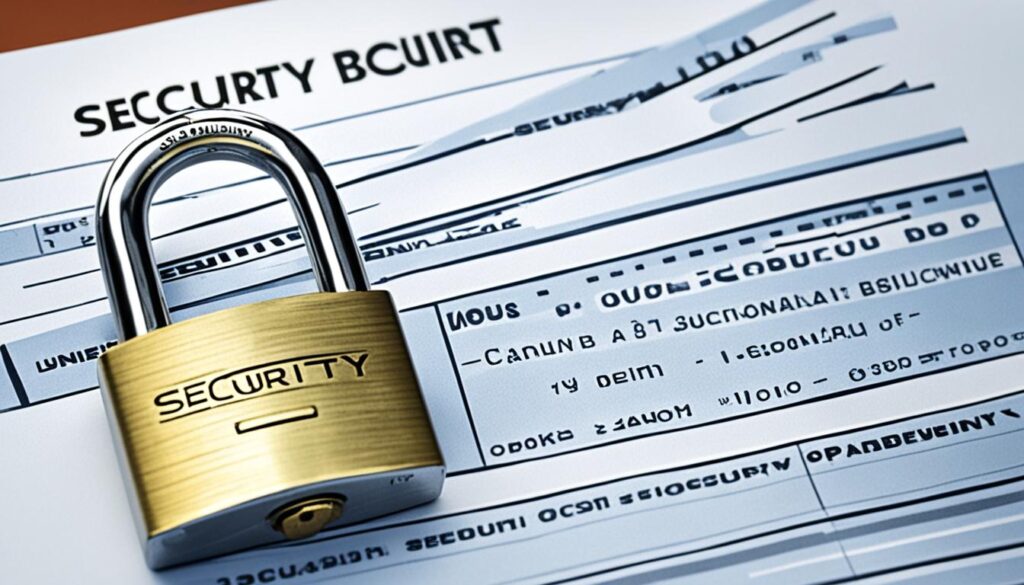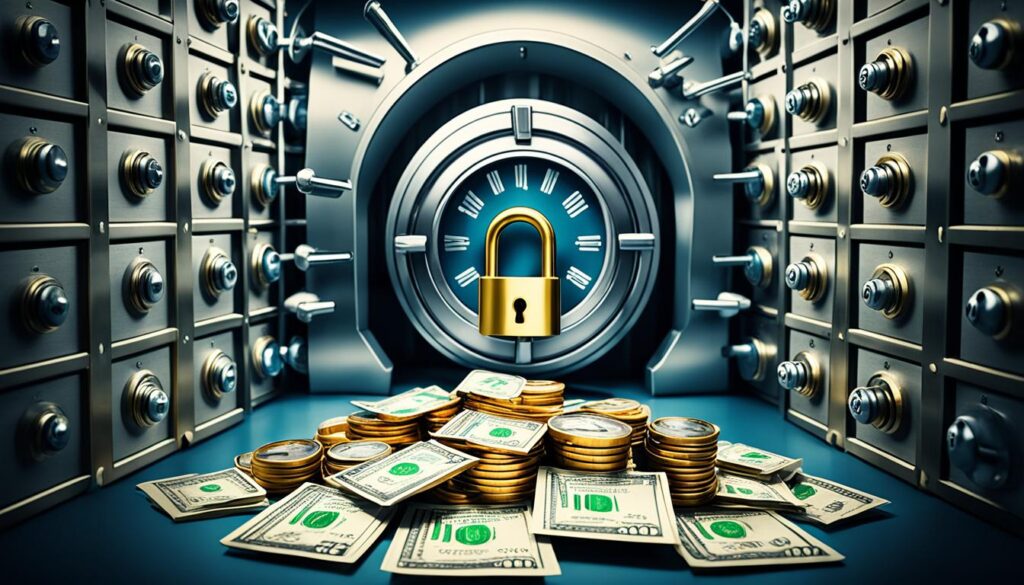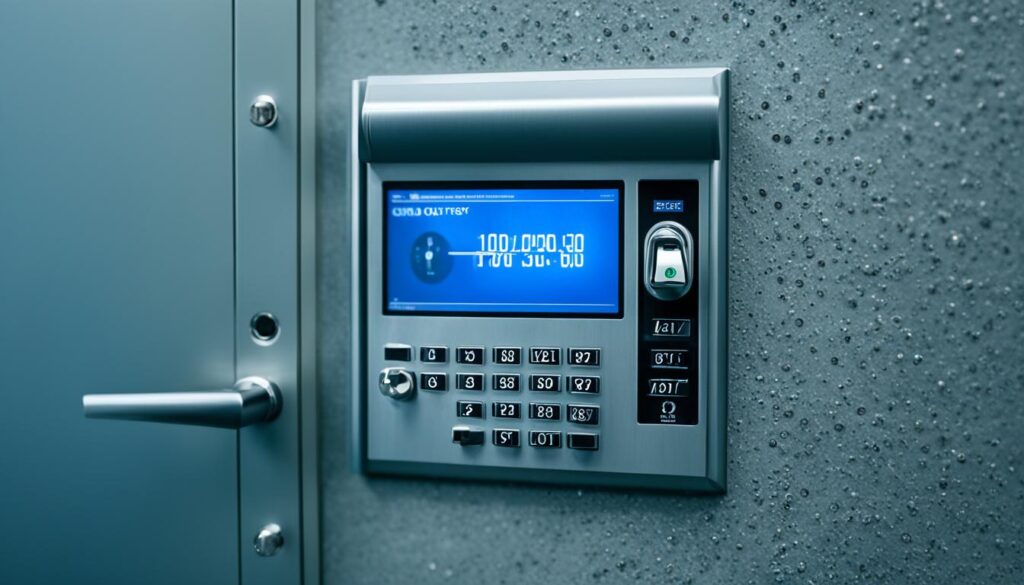Shielding your business bank account is crucial for your financial security. Protect it against unauthorized users and fraud. Although the FDIC covers deposits, it’s vital to know its limits and add your layers of protection.
First, learn about the FDIC insurance and what it covers. Then, put in place strong security steps. These actions help keep your financial accounts safe. This way, you lower the chance of losing money or facing security issues.
Key Takeaways:
- Understanding the limitations of FDIC insurance is crucial for protecting your business bank account
- Implement proactive security measures to safeguard against unauthorized access or fraud
- Partner with a reputable business banking provider to enhance the security of your accounts
- Regularly monitor your accounts for any suspicious activity
- Stay informed about emerging security threats and maintain up-to-date security protocols
Understanding FDIC Insurance for Business Bank Accounts
Your business bank accounts’ safety is key to protecting your money and keeping your business secure. Understanding FDIC insurance, coverage limits, and the importance of using separate accounts is crucial.
FDIC Insurance Coverage
The FDIC insures your deposits at banks, including those in checking, savings, and money market accounts. This coverage protects your money if your bank fails, reassuring you and keeping your finances safe.
Remember, FDIC insurance doesn’t cover investments like stocks or mutual funds. These have their own risks and aren’t part of FDIC’s protection.
Deposit Coverage Limits
FDIC insurance covers up to $250,000 per depositor, per bank, in each account ownership category. So, you get full protection for each account you have up to that amount.
Checking if your bank is FDIC-insured is smart. Most respected banks show the FDIC logo, ensuring your money is protected. Knowing your bank is FDIC insured protects your deposits.
Separate Accounts for Full Coverage
If you have more money than the insurance limit in one account, think about spreading it across different banks. This way, you’ll be fully covered.
Having accounts at various banks can increase your protection. Keep a good record of all your accounts and how much you have in each to stay within the limit.
| FDIC Insurance Coverage | Limit |
|---|---|
| Per Depositor, Per Insured Bank | $250,000 |
| Per Account Ownership Category | $250,000 |
To protect your deposits with FDIC insurance, know its basics. It covers standard bank accounts but not investments. Diversify your accounts and keep up with FDIC’s latest on coverage limits to secure your financial future.
Protecting Your Business Bank Account from Fraud and Hacking
The FDIC insures bank failures, but fraud and hacking are not covered. They pose big risks for businesses. Over 10% of small businesses globally have been hit by these, causing big money losses. So, it’s crucial to protect your bank account.
First, choose a bank known for its strong monitoring. They will spot and stop any unusual activity fast.
Setting limits on how much money can move in one go is also smart. It makes it hard for fraudsters to take big sums. This protects your account better.
Use multifactor authentication for extra security. It requires a password plus a code only you get on your phone. Even if someone knows your password, they can’t get in without the code.
Training your team is also key. Teach them how to stay safe online and spot scammers. This reduces the chance of threats making it through the door.
Always check and upgrade your security measures. This keeps you safe from new dangers. Make sure all your tools and systems are up-to-date.
Remember, cybersecurity isn’t a one-time fix. It’s a journey. Stay alert and learn about the latest threats to beat the bad guys.
By doing these things, you can keep your business money safe from fraud. Remember, protecting your bank account comes first to keep your business strong and secure.

| Measures to Protect Your Business Bank Account | Benefits |
|---|---|
| Partnering with a reputable bank with advanced monitoring capabilities | Timely detection and response to suspicious activities and unauthorized access attempts |
| Implementing transaction size limits | Reduces the risk of significant financial losses in case of fraud or hacking |
| Enabling multifactor authentication (MFA) | Adds an extra layer of security by requiring additional verification beyond passwords |
| Providing cybersecurity training to employees | Reduces the risk of accidental breaches and enhances overall account protection |
| Regularly evaluating and updating security protocols | Ensures alignment with evolving threats and enhances overall cybersecurity posture |
Bank Obligations and Reimbursement for Business Accounts
Understanding your business bank account’s protection is key. Small businesses have less safety than individuals from federal rules. This affects reimbursement after fraud or cyberattacks.
Banks might not pay back for fraud losses. Being proactive in account protection is crucial for a business owner. Don’t only rely on your bank for safety of your business’s future.
Know Your Rights and Responsibilities
Federal protections don’t cover business accounts. Small business owners should know what’s not covered. Educate yourself about your bank account’s needs and precautions.
Knowing the bank’s duties helps you lower risk and keep your money safe.
Be Proactive
Relying on the bank alone isn’t enough. It’s vital to keep your account safe. Strong security and good habits can lessen fraud and cyberattack threats.
Watch your account closely for strange actions. Always use safe login methods. Limit who can access your account to those who truly need it.
Partnering with Trustworthy Financial Institutions
Choosing a reliable bank is crucial for your account’s safety. Look for banks with great security and fraud prevention records.
A bank that’s strong in online safety makes for better sleep at night.
Educate Yourself and Stay Informed
Keeping up with security news and tips is vital for your account’s safety. Always learn about and talk to experts in online security.
Act proactively, find a bank you trust, and stay informed. These steps will keep your business bank account secure and your business’s future bright.
| Bank Obligations | Reimbursement for Business Accounts | Federal Regulations |
|---|---|---|
| Banks are not legally obligated to reimburse businesses for losses resulting from fraud or cyberattacks. | Small businesses do not have the same level of protection and reimbursement as individual consumers. | Federal regulations provide limited protection for business accounts. |
| Business owners need to be proactive in protecting their accounts and not solely rely on banks for reimbursement. | Understanding the limitations and responsibilities involved in maintaining a business bank account is crucial. | Educating yourself about the bank’s obligations and your rights as a business owner is essential. |
| Implementing robust security measures and best practices can significantly reduce the risk of fraud or cyberattacks. | Monitoring your account regularly, using strong authentication methods, and limiting access can enhance security. | Being proactive in protecting your business bank account is necessary for financial security. |
| Partnering with reputable banks that prioritize cybersecurity and offer advanced monitoring capabilities is recommended. | Choosing the right financial institution is critical in ensuring the protection of your business account. | Trusting financial institutions that value financial security is crucial for peace of mind. |
| Continuously educating yourself on cybersecurity measures and staying informed about emerging trends is essential. | Staying informed about the latest security threats helps you mitigate potential risks. | Keeping up-to-date with industry best practices and consulting with experts ensures your business account’s security. |
Tips for Proactively Protecting Your Business Bank Account
Proactively safeguarding your business bank account is crucial. It helps keep your account safe from unauthorized access and scams. Improve your account’s security with these tips:
- Choose a reputable bank that values account security. Opt for a bank with strong safety measures for your financial data.
- Enforce secure login methods, like two-factor authentication. It requires a second check, like a unique code, beyond your password for access.
- Educate your team on avoiding cyber threats. Teach them to spot phishing and the importance of using robust passwords.
- Keep a close eye on your account’s activity. Check your statements often to spot any strange transactions early on.
- Only grant essential staff access to your account. Limiting access reduces the risk of inside jobs that could threaten security.
These steps will go a long way in fortifying your business bank account’s safety. They’ll help protect your money from any security threats.

Protecting Your Business with Secure Login Practices
Secure logins are vital in keeping your business account safe. Hackers can strike through weak passwords and phishing. By using two-factor authentication, you make it tougher for attackers to get in. It adds another layer of identity verification, bolstering your account’s security.
| Benefits of Two-Factor Authentication | Secure Login Tips |
|---|---|
|
|
“Implementing two-factor authentication for our business bank accounts has provided an extra layer of security and peace of mind. It’s an effective way to protect our financial assets from unauthorized access.” – Jane Smith, CEO of ABC Company
Digitizing Payments for Enhanced Security
In our modern world, making payments digitally is easy and safe. Using methods like ACH transfers and virtual cards cuts the risk of fraud. These are less risky than old-fashioned methods such as paper checks and wire transfers.
ACH transfers let you move money between bank accounts without paper checks. This makes things safer because paper checks can get lost or changed. It’s a fast and efficient way to ensure your money gets to the right place on time.
Virtual cards add a strong security layer for buying things online. They create one-time-use numbers tied to your main account. This means every purchase gets a unique number, keeping your real account details safe from hackers. It’s a great way to shop online with less worry.
The Advantages of Digitizing Payments:
“By using digital payment methods like ACH transfers and virtual cards, companies protect themselves and their customers from fraud.”
Digital payments don’t just make things safer. They give businesses more power over their money and make bookkeeping easy. With digital records, managing money is simpler and less likely to have mistakes. It also saves a lot of time.
The Future of Secure Transactions:
As tech gets better, digital payments will keep growing. Businesses need to be on top of this to protect their money and keep customers’ trust. Using ACH transfers and virtual cards can make payments smoother, lower fraud risks, and keep financial actions safe.
Reconciliation and Regular Account Monitoring
Make sure to check your business bank account often to prevent fraud. Compare what you think your account should have with what the bank says. This helps find any wrong or strange transactions.
Look at your bank statements carefully. You should make sure they match your own records. If there are any differences, like money going missing, tell your bank right away.
It’s also smart to watch your accounts for odd or unknown activities. By looking at your spending closely, you can spot and stop fraud early. This can save you money and protect your account from harm.
Keep an eye on your statements for weird signs, such as odd spending or unknown transfers. Watching for these can help catch fraud before it gets bad.
“If some activity looks fishy, tell your bank immediately,” says finance safety expert Jane Hernandez. “They can check what’s going on, stop money loss, and keep your account safe.”
Champion Bank Account Reconciliation Checklist:
| Steps for Account Reconciliation |
|---|
| Compare bank statements with your financial records |
| Verify the accuracy of deposits and withdrawals |
| Investigate any discrepancies or unrecognized transactions |
| Report suspicious activities to your bank immediately |
Using tools that automatically check your account can boost its safety. They are efficient and can find problems faster.

To keep your bank account safe, be proactive. Monitor it often and report any strange activity right away. Teaming up with a reliable bank is key to protecting your money and business.
Strengthening Cybersecurity Measures
It’s crucial to protect your business bank account with a strong cybersecurity plan. Take various steps to keep your systems safe from threats. Let’s look at some key actions:
- Email spam filters: To stop phishing and bad emails, use strong spam filters. Keep these filters updated for the best protection.
- Network traffic monitoring: Watch your network for any strange activity. Use tools like IDS and IPS to catch and stop cyber threats.
- Regular system updates: Always update your systems, software, and apps with the newest security fixes. Old systems are easy targets for cyber attacks, so staying updated is vital.
Apart from the above, teaching employees about cybersecurity is a must. By making sure they know how to spot and deal with threats, you lower your risk of cyber attacks.
Employee Training for Cybersecurity Awareness
“Our employees are our first line of defense against cyber threats. By providing comprehensive training, we empower them to make informed decisions and contribute to the overall security of our business bank account.”
– Jane Smith, CEO of ABC Corporation
Make sure to regularly train your staff in cybersecurity. Teach them about strong passwords, how to spot phishing, and staying away from bad websites. Tell them to report any security issues right away. By doing this and setting up good cybersecurity systems, you will safeguard your business bank account.
| Cybersecurity Measures | Benefits |
|---|---|
| Email spam filters | Prevents phishing attempts and malicious emails |
| Network traffic monitoring | Identifies and mitigates potential cyber threats |
| Regular system updates | Ensures systems are up to date and secure |
Implementing Checks and Balances in Financial Systems
Protecting your business bank account is key. You must put checks and balances in place. These steps prevent employee theft and find any weak spots. This keeps your money safe. Make sure you have clear rules for paying bills. This lowers the chance of fake activities.
Having several people approve invoices helps. No one person should control all money moves. This stops illegal actions. Many people checking the money reduces the risk within your team.
Getting outside audits helps, too. Auditors check your money processes without bias. They find any problems and give advice. This step makes your systems stronger and safer.
“Checks and balances are like extra protection for your money. They make sure everything is accurate and safe.” – Jane Thompson, Financial Consultant
Also, control who can touch your money. Give access only to those who need it. This lowers the risk of outside hacks. It makes your account safer.
To wrap up, using checks and balances is a must for your account’s safety. Create clear rules. Have regular audits. And control who can use your money. This builds a strong shield against threats.
| Benefits of Implementing Checks and Balances | Actions |
|---|---|
| Prevention of employee theft | Require invoice approval from multiple individuals |
| Early detection of vulnerabilities | Conduct regular independent audits |
| Minimization of unauthorized access | Limit access to financial transactions |
Staying Informed and Updated on Security Threats
Keeping up with new security threats is key to safeguarding your business bank account. Knowing the latest in cybersecurity helps you prepare for dangers ahead.
Reading up in industry publications, websites, and resources is a great start. The Association for Financial Professionals (AFP) and ASIS International provide expert advice. They keep you up to date on security and best practices.
Joining conferences, webinars, and workshops is also beneficial. Here, you meet other professionals and learn from experts. They discuss the newest trends and share tips on how to keep your business safe.
Cybersecurity is always changing. New threats appear all the time. So, always be in the know and keep your security measures up to date. This will help to protect your business from risks.
Stay informed. Stay secure.
Partnering with Your Business Banking Provider
Your business banking provider can help keep your accounts safe. They offer advice and use special tools to protect your financial details. This helps make sure your money stays secure.
It’s crucial to talk to your bank about what they do to stop fraud. They will give you tips that fit your needs, making a plan to keep your money safe.
Banking partners use strong technology to guard your accounts. This includes powerful encryption, extra security steps when you log in, and watching for any strange activity in real-time. With these in place, your money and data are safer.
Your bank can also teach you how to keep your info safe. They’ll talk about the right ways for you and your team to log in, and ways to prevent fraud or hacking. This advice is very important for your business’s safety.
Team up with your bank to benefit from their knowledge. They’re always learning new ways to protect your money. This way, you stay ahead of dangers and rules in the financial security world.
Protecting your bank account isn’t just about keeping your money safe. It’s also about making sure your business can keep growing. Working with a good bank makes you feel more confident. You can then fully concentrate on your business.

Expert Advice for Business Bank Account Protection
Seek advice from financial security experts to protect your bank account. They guide you in creating a strong defense against cyber threats.
“Choosing a trusted business bank is key to keeping your money safe. They offer the best knowledge and tools to secure your accounts against threats.”
– Jane Thompson, Financial Security Expert
Listening to expert advice helps fight off cybercriminals. By using their tips, you lower the risks of fraud. This proactive approach is crucial to your bank account’s security.
- Keep your security up to date through expert advice.
- Learn about new security dangers and better safety practices.
- Discuss with your bank how they recommend keeping your accounts safe.
Working with experts against financial security breaches is smart. Don’t be afraid to ask for professional advice. They’re there to help keep your business’s money safe.
Conclusion
Protecting your business bank account is crucial for a stable financial future. Know the limits of FDIC insurance. Take steps to keep your account safe from fraud.
Work with a trusted business bank and check your accounts often. Keep up with new security risks and take steps to stay safe. This will keep you ahead.
Security for your business account needs ongoing effort. Be watchful and take action to guard your money. This will ensure your business has a sound financial future.
FAQ
How does FDIC insurance work for business bank accounts?
The FDIC protects deposits in business bank accounts. This includes checking, savings, and money market accounts.
What types of investments does FDIC insurance not cover?
It does not protect things like stocks and mutual funds.
What is the current limit of FDIC coverage for business bank accounts?
Right now, it covers up to 0,000 per account category. This is for each bank where you have money.
Should I consider opening multiple accounts at different banks to ensure full FDIC coverage?
It’s smart if you have a lot of money in one account. Open several accounts at different banks to make sure it’s all protected.
Does FDIC insurance protect against fraud and hacking?
It doesn’t cover losses from fraud or hacking, which can be a big risk for small businesses.
What additional steps can I take to protect my business bank account?
Work with a bank that’s known for great security. Also, limit how much money can be moved at one time and make sure to train your staff about cybersecurity.
Are businesses legally obligated to be reimbursed for losses resulting from fraud or cyberattacks?
Banks are not required by law to pay back businesses for money lost in fraud or cyberattacks.
How can I enhance the security of my business bank account?
Join with a trusted bank and use high-security login methods. Make sure your team knows about cybersecurity too.
How can digitizing payments improve the security of my business transactions?
Going digital, with things like ACH transfers and virtual cards, can cut down on the fraud risk linked to checks and wire transfers.
Why is it important to reconcile and monitor my bank and credit accounts regularly?
Watching your accounts closely can spot any unauthorized use fast. This can stop bigger losses from happening.
What measures can I take to strengthen cybersecurity for my business?
Start with strong email filters and keep an eye on network traffic. Update your systems often and educate your team. Following security best practices is vital.
How can I implement checks and balances in my financial systems?
Make sure bills are paid and transactions are approved the right way. Control who can make changes to your financials and check them regularly with outside audits.
How can I stay informed about emerging security threats?
Keep up with new information by reading trusted sources like the Association for Financial Professionals (AFP) and ASIS International. Their materials can keep you in the know.
How can my business banking provider help me protect my business bank account?
Talk to your bank about the tools they have to prevent fraud. They can work with you to make a safety plan for your money.




















